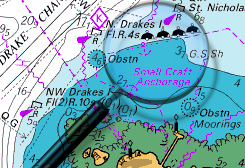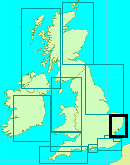You are viewing the expanded version of this Harbour,
for faster browsing
use the regular version here
Roach (River)
Courtesy Flag
Flag, Red EnsignWaypoint
Havengore Bridge Entrance 51:33'.3 N 000:51'.364 ECharts
Admiralty 3750, SC5607Rules & Regulations
Havengore Passage needs permission, see textHazards
Occasional Coaster to Rochford, Much dries out.Tidal Data Times & Range
Paglesham HW Dover + 0110, MHWS 5.2m MHWN 4.2m MLWN 1.0m MLWS 0.2m Havengore Creek: MHWS 4.2m MHWN 3.4m MLWN 1.1m MLWS 0.4m (links)This site is designed for slower, roaming broadband connections, like you would get at sea, so it needs JavaScript enabled to expand the text.
General Description
The River Roach winds it's way from the River Crouch to Rochford,.....
.... with a second entry point for intrepid shoal draft sailors via Havengore Lifting Bridge.
It is a largely unspoiled and desolate looking area but is home to a couple of boatyards and one yacht club.
Also be aware that Potton, Foulness and Rushley Islands form part of the Shoeburyness Firing Range and can be active during daylight hours on weekdays; look out for red danger flags
Perhaps one of it's best advantages is that the deepest part of it in the region of Quay Reach runs north-south direction thus affording good shelter for deep draft craft to anchor. The River Crouch runs East/West and can get a bit exposed for anchoring unless deep within...
For sailing enthusiasts in shallow draught or centreboard craft the various reaches of this river can offer interesting sailing on virtually all points of sail.
Most of the creeks and branches dry out, but there is a reasonable amount of water from the River Crouch as far as Paglesham and beyond. There are a couple of pubs reachable from the shore, but this is not the place for stock up as there are no real town facilities, (unless you dinghy it up to Rochford).
For a bit of peace and solitude The Roach could serve well, and a decent hard dinghy with reliable outboard would come in handy for exploring.
Approach
Only the very shallowest shoal draft craft can tackle the backdoor entrance to the River Roach via Havengore.
If coming from the Southend area this shortcut can save a good many miles at sea however.The maximum draught for even attempting this would be about 1.5 m at high water springs, while at neaps there is unlikely to be more than 0.5 m available. Add to this the fact that, for various reasons and sometimes at short notice those responsible for opening the bridge cannot do it and all your careful planning of tides and routes go out of the window. The locals are attempting to ease the communications between the sailing fraternity and the MOD but it is an uphill job.
Havengore Bridge and the surrounding areas are under the control of the MOD who operate an active firing range. Permission is required to approach the Bridge from seawards across the sands, and during weekdays this needs 24 hours notice. At weekends however the bridge is manned two hours either side of high water. If you are planning to use this approach you need to have arranged things with the MOD. There are detailed instructions at:-
Havengore Bridge Guide for Yachtsmen.pdf
Further Pilotage Directions including entry to the River Roach from the River Crouch...
There is a complete set of bylaws governing this firing range area, but perhaps the most important thing to remember is not to enter the target area (Maplin Sands) shown on the charts, without permission. Secondly not to leave it later than half an hour before high water before striking out across the sands by the shortest possible route to Havengore Creek.
Firing in this gunnery range goes on almost continuously during weekdays and even sometimes after dark, therefore it is dangerous to enter the area without permission.
To try and arrange a ceasefire in advance during weekdays so you can use the bridge contact the Shoeburyness Firing Range Officer on 01702 383211, or use VHF channel 72 callsign "Shoe Base".
The bridge will be opened on request two hours either side of high water during daylight hours only, providing the firing range is not being used. Firing is not common at weekends, but always the best plan is to check in advance. Around high water times the Bridge keeper is on station and can be contacted on VHF channel 72 callsign "Shoe Bridge". The telephone number of the bridge is 01702 383436.
Perhaps the most direct route over the sands is from the green conical S. Shoebury buoy, and passing this at about one hour before high water. Make good a generally northerly course (bearing in mind the tide will be setting you south westwards), and locate and identify the wreck marked with a isolated danger Mark that lays about a mile from the entrance to Havengore Creek. Bear in mind you are unlikely to be able to see much on the shore from this distance as it is low lying.
Once you are level with the wreck, leaving it well on your port side, you can alter course more to the North West and look for the entrance channel leading to the Bridge. You'll have to cross The Broomway, which is an ancient causeway and once the only connection to New England Island.
The Broomway stands slightly proud of the surrounding mud. There are all manner of stakes, posts and markers in the area most of which have no navigational significance.
Approach Havengore Creek keeping it open and look out for buoyage or withies, but as you enter the Creek itself the best water is on the northerly side.
Apart from the tide, wind direction and barometric pressure can raise or lower the depths of water over the sands and Broomway. High pressure associated with settled weather is likely to reduce the depths available.
The tidal streams in this area are complicated a bit by the Broomway, but the one thing to bear in mind is that at high water the ebb starts flowing out of Havengore Creek with no period of slack. This state of affairs continues until the Broomway is uncovered. It is essential therefore to be approaching the bridge well before high water.
Traffic through the bridge itself is controlled by traffic signals, and contact details have already been given.
Once past the Bridge you can pass through Narrow Cuts into Yokesfleet Creek and thence on to the deeper water of the River Roach, as you will be on a falling tide now.
The above option is totally out of the question for deeper draft craft, and their approach to the River Roach, will be made via the River Crouch. (Entry to the River Crouch is described in a separate article).
Entrance to the River Roach is made after a passing Nase Point and giving it a wide berth as you swing southwards, as the deeper water runs close to Wallasea Ness. Leave the red can buoy (Fl.R 5s) guarding the Pinto to port and make for the R/G/R can buoy off Wallasea Ness, leaving that fairly close to starboard as you sweep in towards the Crow red can (Fl.R.10s) further up.
The deepwater runs fairly centrally southwards and as the River bends round to the West the best water favours the outside of the bend. This is Quay Reach and there is plenty of room to anchor here where shelter can be obtained from strong winds with a westerly component.
Further explorations and mooring opportunities are covered in the next section.
The Roach Sailing Association website can give further guidance, and has many photos:
Berthing, Mooring & Anchoring
Anchorages within the River Roach are now described...
....As Quay Reach turns westwards into Devil's Reach the best water is found on the outside of the bend, and there is a yellow racing buoy "Roach" moored in deep water that should be left to port.
The yellow buoys found in Roach (and the Crouch) are normally laid from March to December, and are much in use by members of the Burnham yacht clubs during the summer as racing marks.
Further into Devil's Reach Yokesfleet Creek branches off to port (leading to Havengore), while the main run of the Roach continues westwards and then swings to the South West.In this stretch there may be found oyster crates, generally around the low water springs mark and indicated by small green buoys or withies... they need to be avoided. The south-westerly swing is in the area where Paglesham Pool branches off to the North, and harbour authority green and red buoys commence marking the channel in Paglesham Reach.
In the area described above there are a couple of anchoring opportunities firstly in Quay Reach as already mentioned, at Horseshoe Corner just past the yellow Roach Buoy on the southern side of the River, in the entrance to Yokesfleet Creek, and in the entrance to Paglesham Pool.
Further Details...
The Paglesham Pool Anchorage has very little water, but enough water to lay afloat for most boats will be found in the others mentioned. It must be remembered that commercial traffic in the form of small freighters and fishing boats use the River sometimes at night too. It is therefore essential to use an anchor light and to try and keep out of the fairway.
Once in Paglesham Reach, a black timber boatyard will be seen on the north-western shore, and small craft moorings will be seen either side of the channel. The boatyard used to be solely concerned with selling powerboats and visitors were discouraged from using any of the facilities.... including the landing stage. This boatyard has changed hands in recent years and as we write (March 2017) it appears to be owned by a company which has no interest in itinerant yachtsmen. It is no longer a place where visiting boats can tie up/moor and proceed to the pub; there are no facilities at all for yachtsmen.
The intrepid gunk holer may like to push on up the River to Rochford, where there are a couple of commercial wharves (pleasure craft not welcome), and the Wakering Yacht Club (mainly motorboats).
There is a boatyard Carter and Ward, based Sutton Wharf on the North bank of Fleethall Creek. They have the slipway up to 50 tonnes, a travel lift for boats up to 40', together with hardstanding.Their website is at:-
Sutton Wharf (suttonwharfboatyard.com)
If exploring this area watch out for the electricity cables crossing Fleethall Creek with only 8.5 m clearance.....
Between Paglesham Reach and Rochford there are no anchoring opportunities unless you can take the ground, thus keeping out of the narrowing channel.
Other creeks in the area are strictly for gunk holers, but Sutton's boatyard (Now called Wakering Boatyard) will be found in Potton Creek.
If planning to get here via The Violet, and then Potton Creek be aware that there is a concrete causeway that stands well proud of the creek bed and also a swing bridge operated by the MOD. This is manned a couple of hours either side of high water (daylight hours only) and will open on request. Telephone 01702 219491, call on VHF channel 72.... or give three hoots on the horn.
Strangers are best advised to explore the lesser creeks by dinghy on a rising tide before attempting any forays in a yacht. Many of the gutways are quite steep sided and there could be unpleasant consequences should you get stuck on one of these banks with a falling tide.
Updated April 2023
Facilities
This whole area is a very short on any kind of facilities, there is no convenient way of obtaining stores, no banks and no post offices... let alone cashpoints.
Public transport is hopeless, this is no place for crew changes.
It may be possible to get water in Jerry cans from Shuttlewoods boatyard in Paglesham Reach.
Trailer Sailer's can launch from the slipway at Shuttlewoods Boatyard, available at most of the tidal range... there are charges.
History
The River Roach is a river that flows entirely through the English county of Essex. It flows through the town of Rochford and joins the River Crouch at Wallasea Island.
Rochford takes its name from Rochefort, Old English for Ford of the Hunting Dogs. The River Roach was originally called the Walfleet (Creek of the foreigners). It was renamed the Roach in what is known as a back formation. This is where it is assumed that Rochford means ford over the River Roach so they renamed the river to fit the theory.
It has its source near Marylands Wood in Hockley. It runs mostly underground, past Plumberow School, then enters Ashingdon, under the Harrogate and Broadlands areas, then it can be seen running through beautiful countryside beside Footpath 15 until it enters Hawkwell near Footpath 7 and continues on through Rochford to the tidal River Roach at Stambridge Mills. It eventually meets the River Crouch at Wallasea Island.
In the upper reaches of the river, fish such as Chub, Roach & Eels can be found.
Paglesham.
Paglesham is situated in the north east of the Rochford Rural District, Essex. The Parish of Paglesham includes two hamlets of East End and Church End, which are situated near the River Crouch and Paglesham Creek. It is part of the Roach Valley Conservation Zone.
At the East End is The Plough and Sail Public House. There is an unmade road (Waterside Road) full of large potholes leading to a boatyard on the River Roach. There are small number of houses.
At Church End, the Church, St Peter and the Punch Bowl Inn can be found. There are a small number of houses and a farm.
The two hamlets form one of Essex’s oldest fishing villages and the area was once renowned as a smuggling centre. Including being home to one of the more famous smugglers in the region, Hard Apple, who was actually the parish councillor and local constable William Blyth.
Paglesham was also an old civil parish, connected to Rochford.
The text on this HISTORY page is covered by the following licence
http://en.wikipedia.org/wiki/Wikipedia:Text_of_the_GNU_Free_Documentation_License
Eating, Drinking & Entertainment
The only opportunity for the hungry and thirsty skipper and crew is close by the boatyard at Paglesham Reach, and it comes highly recommended.
The Plough and Sail is located at Paglesham East End, close by the yard. Food is served at lunchtimes and in the evenings although it may be advisable to book at weekends in the summer, as it gets busy. Telephone 01702 258242.
There are one or two other pubs but they are a good hike away from any mooring or anchoring spots.
If you can get to the Wakering Yacht Club ( maximum 1 m draft) at Rochford they may be able to accommodate you on their drying pontoon. The clubhouse is open most days and meals are available at the weekend. Contact details have already been given.
Links
|
Your Ratings & Comments
The RMHA buoys are those downstream of the boatyard pontoon, buoys upstream are private. Any unoccupied buoy may be used (they advise using your own strops) and they ask for £15 a night payable by bank transfer. See https://roachsailingassociation.org/wp-content/uploads/2025/08/RMHA_MooringsForVisitors.pdf








